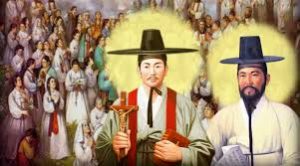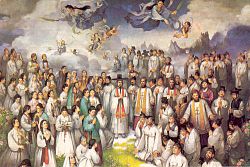Forgiveness Vindicated – Memorial:
Saints Andrew Kim Tae-gon, Paul Chong Ha-sang and Companions
(Heb 5:7-9; Ps 31; Lk 7:36-50/Jn 19:25-27)
********************************************************************
A lady priding herself on her beauty confessed to a priest she was guilty of the sin of vanity and narcissism. The priest hopped out of the confession box, opened her door, had a look at her, popped back into his side, and told her that wasn’t a sin, it was just a mistake!
The liturgy today invites, along with St. Paul and the Korean martyrs, to stand firm in the Good News of forgiveness.
In the gospel, Jesus uses the incident of a woman’s extravagant gesture of washing his feet with her tears and wiping them with her hair to teach us the importance of forgiveness in our lives, and in the kingdom of heaven. Knowing the judgmental thoughts of Simon the Pharisee at that sight, Jesus shares a parable about a debtor forgiven a greater amount who would love his creditor more.
There is much happening under the surface here. First, the woman had greatly sinned, but had come to him for forgiveness, and so must we, no matter how greatly we have sinned. Second, the greater her sin, the more forgiveness she received, and the more grateful she became, as evidenced by her courageous and extravagant gesture. The teaching here is with God, we cannot lose. The more we have sinned, the more we are forgiven and the more we are loved. On the other hand, the more we are hurt, the more opportunity we have to forgive, and the more we love. It is always a win-win situation with Jesus – the more we are forgiven, the more we can love.
To emphasize that lesson to Simon the Pharisee, Jesus then reminds the woman her faith in him has saved her and her sins are forgiven, which shocks those at the table with him. That is a reminder to us we will never understand the depth of the Father’s unconditional love that manifests itself best as forgiveness.
That forgiveness forms the basis of the exhortation to stand firm in the good news St. Paul give to the Corinthians. That good news turns out to be the whole paschal mystery pattern of Jesus Christ – his suffering, his death on the cross, his resurrection, his appearances to his friends, his ascension into heaven, and I would add, the sending of his Holy Spirit on the early church at Pentecost.
This passage from Corinthians is refreshing to ponder, because it focusses on what I call the “missing mystery” – the appearances of Christ to his friends. We skip that mystery in the rosary (the Glorious Mysteries are Resurrection, Ascension, Pentecost, Assumption and Crowning of Mary). We also skip it in the creed (Jesus rises from the dead and ascends into heaven). It is also omitted in the third canon of the Eucharist (his glorious resurrection and ascension into heaven).
St. Luke, addressing Theophilus in the first chapter of Acts, at least mentions the appearances (“After his suffering he presented himself alive to them by many convincing proofs, appearing to them for forty days and speaking about the kingdom of God” – Acts 1:3). I would add Jesus was also teaching them to grieve and mourn his loss, especially to Mary Magdalene, who tried to cling to him because she wanted him back. Jesus had to strengthen their faith, as they would no longer see him, but if they could mourn and grieve his loss, let him ascend to the Father, then he would send his Spirit to be with them in a new way, which he did, at Pentecost, and they were transformed into the Church.
I believe the appearances of Jesus, especially for St. Paul, also vindicates the counter-cultural teachings of Jesus throughout his ministry (be poor in spirit, lose our lives to find them, be humble, give our lives away, live simply, turn the other cheek, do good to those who oppress us, and especially, love our enemies and forgive those who hurt us). Actually, every appearance of Jesus to his disciples after his resurrection was an experience of forgiveness. After all, they had betrayed him, denied him and abandoned him – should he not have had reason to be angry with them? – yet there was only forgiveness, peace and joy, especially in the Upper Room.
That, for St. Paul, is the core of the Good News. We have all sinned much, and Paul was no exception. He approved the killing of St. Stephen, was hunting down the followers of Jesus, throwing them in jail, and had probably facilitated the execution of many others. The appearance of Jesus to Paul on the road to Damascus had to be a dramatic, startling, astounding and life-changing experience of forgiveness – “Saul, Saul, why are you persecuting me?” Jesus forgave him and that experience of forgiveness transformed Paul into the greatest evangelist of all time. He who was forgiven much, was able to show much love.
It is the same with all the other disciples, and so it must be with us. The Paschal Mystery of Jesus Christ means we have all been forgiven every sin we have ever committed and will commit – they are all forgiven. All we have to do is acknowledge our sin, repent, and come to Jesus, especially through the sacrament of reconciliation, to receive that forgiveness and be reconciled to his body, the Church.
The psalm then articulates beautifully what our response to that unconditional love of God coming to us as forgiveness should be – grateful heartfelt worship and praise. The Lord is good, God’s love is steadfast forever, and he has become our salvation. We are now to give thanks, extol our God, and recount his deeds, as St. Paul did in spades.

Korean martyrs
Today, the church honors the Korean Martyrs who truly followed in the footsteps of St. Paul and lived the readings of today. In the early 1600’s, Christian communities began to flourish in Korea under the leadership of lay people. On 1836, missionaries from France, members of the Parish Foreign Mission Society, secretly entered the country. The Christian communities began to encounter hostility and, during the persecutions of the mid-19t century, over 10,000 Christians were killed. Andrew Kim Tae-Gôn, the first Korean priest, was one of these. Paul Chong, a seminarian and catechist, was one of the many lay people who suffered. These and 101 other Korean martyrs, clergy and lay, young and old, were canonized in 1984.

Here is an excerpt from a witness by Andrew Kim Tae-gon: “But as the Scriptures say, God numbers the very hairs on our head and in his all-embracing providence he has care over us all. Persecution, therefore, can only be regarded as the command of the Lord or as a prize he gives. Hold fast, then, to the will of God and with all your heart, fight the good fight under the leadership of Jesus; conquer again the diabolical power of this world that Christ has already vanquished. I beg you not to fail in your love for one another, but to support one another and to stand fast until the Lord mercifully delivers us from our trials. There are twenty of us in this place and by God’s grace we are, so far, all well. If any of us is executed, I ask you not to forget our families. I have many things to say, yet how can pen and paper capture what I feel? I end this letter. As we are all near the final ordeal, I urge you to remain steadfast in faith, so that at last we will all reach heaven and there rejoice together. I embrace you all in love.”
The Eucharist makes present to us, through Word and Sacrament, that unconditional love and forgiveness of Jesus manifested by his passion, death resurrection, appearances, ascension and the sending of his Spirit at Pentecost.
May our celebration empower us to stand fast in this good news of forgiveness, and live it out in our lives through grateful praise and loving service, living Calvary in slow motion.




Thanks for the messages and teachings about having forgiveness and unconditional love like Jesus himself . He showed this through passion week when he was about to be crucified after the Last Supper. He knew one of his disciple will be betraying him by handing him over to the soldiers and Pilate. But, he had the heart to forgive him for what he has done. He dyed on the cross and resurrected the next day and appeared to his disciples and Mary Magdalene after 3 days. He wants us to the same by being able to forgive one another and forgive ourselves. Also, we are to love one another, loving ourselves and loving our enemies. This is the difficulty for some people who have hard time to forgive people who hurt them. They keep on holding the bitterness, stubbornness and grudge over other people and themselves. If we can let go the past and open ourselves to receive God’s forgiveness and healing ; then we can praise and worship the Lord joyfully. Amen
Thanks Bishop Lavoie for the homilies and have a great time Australia. We are looking forward for more homilies, teachings and pictures . Blessed !